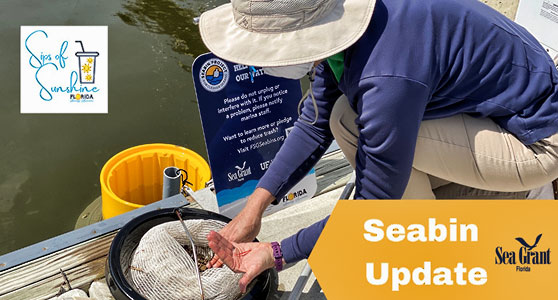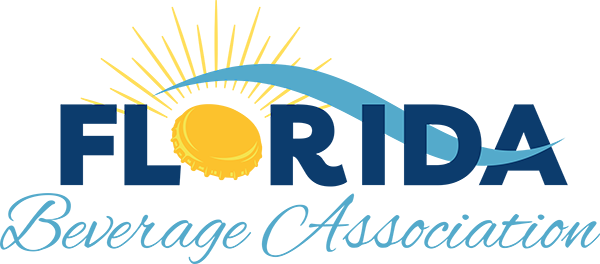Seabin Project Check-in!
With the midway point of the year breezing by, we thought it would be the perfect opportunity to check in on one of our FBA Community Grant projects ―Florida Seabins.
 We were thrilled to be able to provide a grant to the University of Florida (UF)/Institute of Food and Agricultural Sciences (IFAS) and Florida Sea Grant Program’s Seabin project and to see the first of three Seabins installed and working at the Marineland Marina on Earth Day this year.
We were thrilled to be able to provide a grant to the University of Florida (UF)/Institute of Food and Agricultural Sciences (IFAS) and Florida Sea Grant Program’s Seabin project and to see the first of three Seabins installed and working at the Marineland Marina on Earth Day this year.
What are Seabins? They are a combination of floating trash cans and vacuums. Placed in clean marinas or other calm bodies of water, Seabins float on the surface and collect debris from the waterway and have a minimal impact on local sea life.
How do they work? The Seabin skims the surface by pumping water through its filters to capture trash and other debris as well as clean the water from contaminated organic materials. It has an oil absorbent pad that is able to absorb petroleum-based surface oils and detergent, which is found in most marinas. To learn more, visit Seabinproject.com.
What is a clean marina? As part of the Florida Clean Marinas Program, marinas can voluntarily elect to apply and adhere to a strict set of guidelines and best practices that showcase their commitment to protecting Florida’s waterways by implementing a set of environmental Best Management Practices (BMP). The BMPs must address sensitive habitats, waste management, stormwater control, spill prevention, and emergency preparedness. For more information, you can check out the Florida Department of Environmental Protection.
What happens to the debris that is collected? At this time, the debris is being used for research. Understanding the type and quantity of what is captured by the Seabins will prove critical in understanding marine pollution and help develop ways to reduce it.
We are working with Dr. Maia McGuire of UF/IFAS and Florida Sea Grant who is overseeing the project, which includes not only strategically determining where to place the three bins but also training the marina staff to clean and collect debris so that it can be used in research.
The Seabin that was installed in Marineland Marina was the first in our state to be placed in a clean marina and has now been in use for three months. Dr. McGuire recently reported that the bin has been functioning as it should, and the dockmaster has been diligently collecting the debris. They are weighing how much debris is collected while also reporting the number of pieces of plastic captured. It was also noted that the oil absorbent pad performed beautifully when a boat discharged oil from its bilge.
The second of the three Seabins funded through the FBA Community Grant was installed a few weeks ago at the Santa Rosa Yacht Club.
You may be asking how something so small can have an impact? Actually, during the course of a year, a Seabin can collect 1.5 tons of marine debris.
Dr. MacGuire is currently researching where the most strategic location will be for the final and third Seabin with our grant funding and was excited to report that she has received another grant to install an additional 6 Seabins in our state.
We will continue to check in and report on the impact that Seabins are having on our local waterways.
What can you do? Residents and visitors can help in protecting Florida’s waterways by remembering to place recyclables and litter where they go. We encourage you to find out more information on this program and support installing a Seabin in your local marina.
You can find out more information at:
Florida Sea Grant - flseagrant.ifas.ufl.edu/seabins/
Seabin Project - https://seabinproject.com
Florida Clean Marina Program - https://floridadep.gov/rcp/clean-marina/content/clean-marina
Every Bottle Back: www.innovationnaturally.org/plastic/
Tags: Blog


